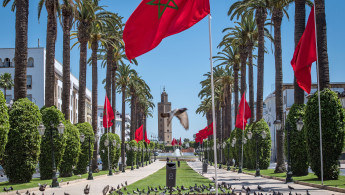Europe's Moroccans start returning home via Spain for holidays again
"Finally!," said 20-year-old Reda as he arrived at the port of Algeciras in southern Spain Wednesday on the first day of an operation to ease the return home of Moroccans living in Europe for their summer holidays.
Millions of Moroccans like him have waited three years to once again be able to drive to a port in Spain and then catch a ferry to Morocco to see loved ones during the summer break.
The short 14-kilometre (nine-mile) route across the Strait of Gibraltar had originally been shut in March 2020 when Morocco severed transport links with Europe over the Covid-19 pandemic.
But while Rabat reopened its maritime borders last summer to other European nations, connections between Morocco and Spain remained shut until April due to a diplomatic dispute between the two nations.
"I couldn't sleep last night, I was too excided," said Reda, who drove 4,500 kilometres with his girlfriend to Algeciras from Helsinki, where he is studying, to catch a ferry to visit his family in Agadir, in southwestern Morocco.
Some 3.3 million people and over 760,000 vehicles made the crossing in 2019 during the last "Operation Crossing the Strait", which runs this year from June 15-September 15.
Spain's government has called the seasonal migration "one of the biggest flows of people across continents" in such a short time.
Driving home for the summer holidays "is almost like a tradition for us", said Reda, wearing flip-flops and a bucket hat and surrounded by cars loaded with bags.
Nearby families looked for shady spots to eat within view of imposing red ferries.
The biggest flow of passengers is expected at the end of the month and the first weekend of July after schools close across Europe.
The resumption of maritime traffic comes after Spain in March supported Morocco's autonomy plan for Western Sahara -- a disputed territory mostly controlled by Rabat, but claimed by the Polisario Front -- ending a year-long diplomatic crisis.
While ferries run to Morocco from Italy and France, these routes are longer and more expensive.
"It's shameful... with these disputes between politicians, it is regular people who foot the bill," said Abdel Ghani, a 67-year-old Spanish-Moroccan pensioner who came to Algeciras to buy a ferry ticket.
Spanish and Moroccan authorities expect the number of people making the crossing this year will surpass that of 2019 due to pent up demand.
Several thousand police officers, social workers and volunteers have been mobilised in both nations to assist travellers on the roads and in ports and ensure traffic flows smoothly.
The dearth of passengers in recent years has meant a loss in revenues for shipping companies, ports and service stations and hotels along the route.
Direct and indirect losses amounted to nearly 500 million euros ($520 million) in the last two years, according to the Association of Service Companies of the Bay of Algeciras (Aeseba), which represents 90 local firms.
"Unfortunately the money lost can't be recovered," the president of the association, Manuel Piedra, told AFP.
The association is "pleased" with Spain's diplomatic reversal "and that the political situation has been resolved", he added.
The port authority of Algeciras, which is responsible for 75 percent of the sea traffic between Spain and Morocco, estimates it lost 40 million euros.
Reda said his parents "went mad" last summer when Morocco resumed its maritime links with other nations but not Spain.
"When I was a child, I used to travel by car every summer" to Morocco, he said as he waited for his ferry in Algeciras.
"It's awesome," he said, breaking into a smile.





 Follow the Middle East's top stories in English at The New Arab on Google News
Follow the Middle East's top stories in English at The New Arab on Google News
![Dozens of people turned out for the funerals [Getty]](/sites/default/files/styles/image_330x185/public/2024-11/GettyImages-2185229760.jpg?h=e7c891e8&itok=1bctDcE6)
![The UAE is widely suspected of arming the RSF militia [Getty]](/sites/default/files/styles/image_330x185/public/2024-11/GettyImages-472529908.jpg?h=69f2b9d0&itok=Yauw3YTG)
![Netanyahu furiously denounced the ICC [Getty]](/sites/default/files/styles/image_330x185/public/2024-11/GettyImages-2169352575.jpg?h=199d8c1f&itok=-vRiruf5)